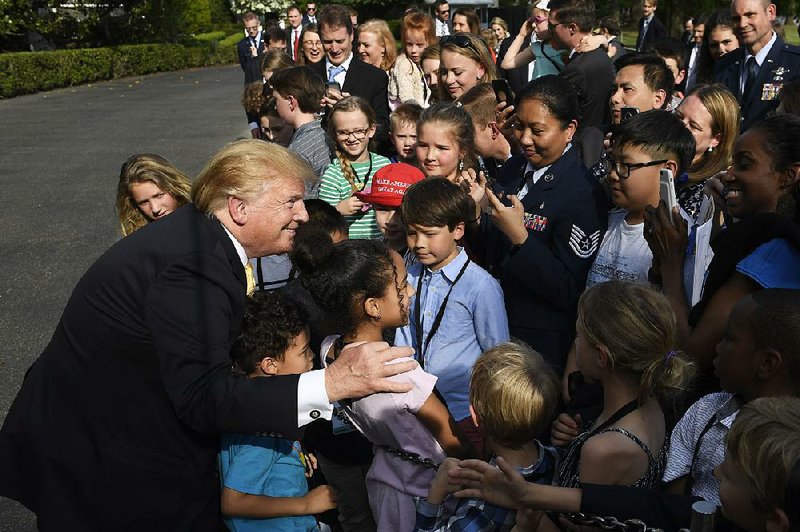President Donald Trump disputed Thursday that he had told then-White House counsel Don McGahn to seek the firing of special counsel Robert Mueller in the midst of his investigation into Russian interference in the 2016 election.
The episode, detailed in the report by Mueller that was publicly released last week, is among those being scrutinized by Democrats as they continue to investigate whether Trump sought to obstruct Mueller's investigation. In a morning tweet, Trump sought to blame the media for misreporting what happened.
"I never told then White House Counsel Don McGahn to fire Robert Mueller, even though I had the legal right to do so," Trump wrote. "If I wanted to fire Mueller, I didn't need McGahn to do it, I could have done it myself. Nevertheless, Mueller was NOT fired and was respectfully allowed to finish his work on what I, and many others, say was an illegal investigation."
McGahn emerged as a key witness in Mueller's 448-page report, detailing several occasions when Trump ordered him to "do crazy s***," according to the special counsel's findings. That included trying to persuade the Justice Department to get rid of Mueller, according to the report.
McGahn didn't, and almost resigned over the episode. He also refused to issue a public statement denying that the reports Trump wanted to fire Mueller were true when the president asked him to, the report says.
Though Trump has claimed "total exoneration" by the Mueller report, he and his aides have continued to attack Mueller and his team and aggressively dispute some of the more damaging details it contains. Trump declined to sit for an interview with Mueller in which he would have had an opportunity to rebut other testimony.
The Democratic chairman of the House Judiciary Committee issued a subpoena this week ordering McGahn to testify before the panel next month and hand over documents and records pertaining to federal investigations of Trump, his finances, his campaign and allegations that he sought to obstruct justice.
The White House is resisting the move, along with other efforts by Democrats to call key figures in the Mueller investigation to testify before Congress.
In television interviews Sunday and Monday, Trump legal spokesman Rudy Giuliani and former Trump lawyer John Dowd also sought to cast doubt on McGahn's recollection of Trump's order to seek Mueller's firing.
Both argued that Trump wasn't as direct as McGahn seemingly believed. Trump was only seeking to have Mueller "vetted," Dowd said during an appearance on Fox News.
Mueller detailed two calls in which McGahn said Trump "directed him" to tell Deputy Attorney General Rod Rosenstein that Mueller should be removed from his position.
The first call took place in June 2017 after The Washington Post reported that Mueller was investigating whether Trump had obstructed justice as part of the Russia inquiry.
McGahn recalled Trump said something like, "You gotta do this. You gotta call Rod," according to Mueller's report.
Trump made a more direct request in a second call, saying something along the lines of, "Call Rod, tell Rod that Mueller has conflicts and can't be the Special Counsel" and "Mueller has to go," according to the report, which documented McGahn's recollections.
Mueller's report did not find sufficient evidence to file charges of criminal conspiracy with Russia against Trump or anyone associated with his campaign. It did not offer a conclusion about whether Trump obstructed justice.
Attorney General William Barr later concluded that there was not sufficient evidence for obstruction-of-justice charges, but House Democrats are continuing to pursue that issue aggressively.
Information for this article was contributed by Karoun Demirjian and Josh Dawsey of The Washington Post.
A Section on 04/26/2019
